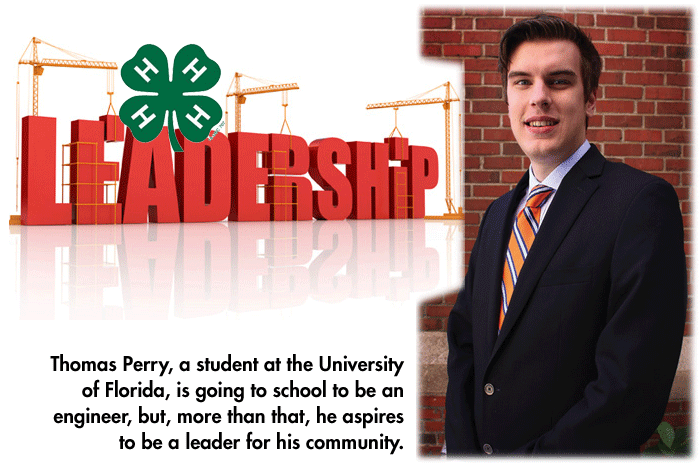| Thomas Perry discovers his ability to be a frontrunner for his community |
AT AGE 18, Thomas Perry already knows he wants to work as an engineer. But what he wants to be is a leader. He discovered it while he attended Moore Haven High School in Glades County, just as he learned biology, chemistry, geometry, reading, and writing.
That’s important because it’s an aspiration to put his education to its highest purpose — the service of others. Indeed, Thomas defines leadership itself as, “Helping a group go toward a goal they want to achieve.”
Thomas grew up in a place where everyone knows everyone. When Thomas filled up at the local gas station, he could pay with a simple signature because the clerk recognized him and knew the family. To lead, you need to know more than individual people, though. You need to know the community. You need to see possibilities.
That requires getting off campus. Hendry County and the University of Florida’s Institute of Food and Agricultural Sciences (UF/IFAS) share two vans that essentially shuttle kids like Thomas to possibilities. They go behind the counter at the bank, see the production of sugar cane up close, walk the halls of county government, meet commissioners, and attend adult gatherings, such as an opening reception for a local biotech company.
Like anything else, it takes a little practice to get good at looking a CEO in the eye as you shake her hand. When you learn about how your community works, you can think more expansively about how to improve it. Thomas acknowledges that as a 16-year-old, one of the reasons he joined the 4-H Leadership Program run by UF/IFAS Extension was to build a résumé that would make his case for admission to become a Gator.
The 4-H agent who runs the program, Sonja Crawford, said that’s not unusual for a student at Moore Haven or any other high school. Her job is to make an extracurricular activity the basis of more than a fond memory. A leadership program done right can provide foundational experiences.
The hope, Crawford says, is that leadership program alumni such as Thomas will return after college graduation and make their hometowns better places to live. Moore Haven High Principal George Coates, who nominated Thomas to participate in the leadership program, says he hopes it creates ambassadors that let the world outside Glades know about the talent, aspiration, and work ethic among the 350 seventh-through 12th-graders at his rural school.
Leadership programs open participants’ eyes to possibilities, much like education in general aims to do. UF/IFAS has a long history running 4-H programs across the state in recognition of the need to supplement academic skills that schools teach with programs that help children develop character traits and an outlook that prepare them to run the world we bequeath them.
Last year, we launched the UF/IFAS Center for Leadership to organize our leadership training for people of all ages. It signals the UF/IFAS commitment to developing human resources as well as farm and natural resources. It helps us deliver on the UF/IFAS core mission of helping to improve the lives of all Floridians.
I’d argue that Thomas really became a Gator two years before he was admitted to the University of Florida. Through his participation in the UF/IFAS Extension 4-H program run by Crawford, he was being steeped in the Gator service ethic.
Now that he’s here in Gainesville as a freshman in our College of Engineering, he participates in student government. He already talks about post-graduation plans to build on his engineering training to become a manager.
One day in December, Crawford and Coates supervised Moore Haven 4-H Leadership Program students who were volunteering to transform a local civic treasure, the Captain Francis Hendry House, into a holiday gathering place for their community. It was among the last of the six months of activities Crawford planned for the students.
A successful leadership program promotes the kind of thinking Thomas is embracing. He’s well on his way to making the connection between his own ambitions and securing a better future for a company and a community. That’s how we know leadership training is working.
CREDIT
article by JACK PAYNE
ABOUT THE AUTHOR: Jack Payne is senior vice president for agriculture and natural resources at the University of Florida’s Institute of Agricultural and Life Sciences.

